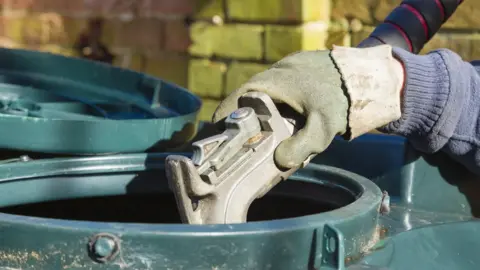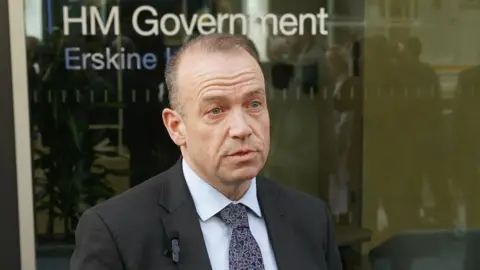Autumn Statement: All NI households to get £200 heating oil payment
 PaulMaguire/Getty Images
PaulMaguire/Getty ImagesAll households in Northern Ireland are to get a £200 payment to help with energy costs.
Originally, this payment was supposed to be £100 and was only for people who use home heating oil.
But the Treasury has said it will now be a universal payment "in recognition of the prevalence of alternative fuel usage in Northern Ireland".
The payment will be made as a credit to electricity accounts but it is not clear when it be paid.
It will come on top of a separate £400 credit, though its not clear when that will be paid either.
Home heating oil is the main fuel used by households in Northern Ireland.
The £200 oil payment was announced on Thursday by Chancellor Jeremy Hunt as part of his Autumn Statement.
The chancellor also told the House of Commons that Northern Ireland will receive an additional £650m for public services.
It will be paid out over a two-year period in 2023-24 and 2024-25.


The chancellor promised to continue helping with energy costs and that includes the unexpected bonus for some Northern Ireland households.
The decision to transform the £200 "oil payment" into universal household support may reflect the fact that trying to target it was just too time consuming.
There is no central register of who has oil heating so any targeted scheme was certain to have gaps.
But the question of when this support will be paid out is still unanswered and it may not arrive until the new year.
And while this extra money will be welcome it can't mask the fact that many households still face a grim outlook.
The official economic forecaster, the Office for Budget Responsibility (OBR), says the UK faces its biggest drop in living standards on record as inflation continues to eat into people's wages.
The OBR thinks that real incomes will fall by 7% in the next two years, the biggest drop in 60 years.

Stormont is currently facing a £650m overspend in this year's budget.
Northern Ireland Office Minister Steve Baker told BBC News NI the new money announced by the chancellor would not be available to tackle the overspend.
He said: "That money is for next year and the year after.
"What we have to do this year is make sure that there isn't an overspend. The Treasury have been very clear with us, there isn't a bailout this year.
"We will bring forward plans to make sure we don't have an in-year overspend. That is going to involve some difficult choices."
 Brian Lawless/PA Media
Brian Lawless/PA MediaNorthern Ireland Secretary Chris Heaton-Harris is expected to make a statement on Stormont's budget next week.
In a statement issued after the chancellor's announcement, Mr Heaton-Harris said the economic challenges facing the UK were "further compounded in Northern Ireland with the current lack of locally-accountable leadership".
Northern Ireland does not have any locally elected ministers in post because of a stand-off over post-Brexit trading rules.
The Democratic Unionist Party (DUP) is refusing to return to Stormont's power-sharing executive government until those Brexit rules, known as the Northern Ireland Protocol, are scrapped or changed.
The Northern Ireland secretary criticised Stormont parties for the current overspend.
"Despite receiving the biggest funding allocation since devolution began, decisions made by outgoing ministers have left a £660m black hole in the executive's finances," Mr Heaton-Harris said.
"In the absence of a functioning executive, my department remains committed to closing the gap in public funding and protecting the ongoing delivery of vital front line services, but this is an unsustainable situation that I want to see resolved by the restoration of local leadership as soon as possible."


